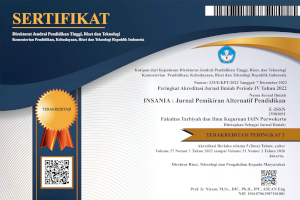Orientasi Studi Islam di Indonesia: Mengenal Pendidikan Kelas Internasional di Lingkungan PTAI
DOI:
https://doi.org/10.24090/insania.v11i2.179Keywords:
Islamic education, Islam colleges, international classAbstract
Enthusiasm growth to comprehend the Islam more as “religious tradition that existâ€, historical, compared to “set of doctrine†in al-Qur’an and Hadits, finding its momentum in growth of Islamic study in some notable and big university in United States. This then applied in religious Islam colleges. There also shift from more normative character of Islamic study to more historical, sociologic, and empiric one. Second, there’s tendency, broader scientific orientation. If at previously period scholar orientation tends to middle easterly, especially al-Azhar University, in the last two decade looked to be progressively wide of and immeasurable. Because that, nowadays started development of Islamic education instructing at demand of enhancing implementation quality, management, curriculum with the international standard. One of them is by opening international class (Islamic education), that expected can compete in global level..Downloads
Downloads
How to Cite
Issue
Section
License
Authors who publish with this journal agree to the following terms:
Authors retain copyright and grant the journal right of first publication with the work simultaneously licensed under a Creative CommonsAttribution-ShareAlike License that allows others to share the work with an acknowledgment of the work's authorship and initial publication in this journal.
Authors are able to enter into separate, additional contractual arrangements for the non-exclusive distribution of the journal's published version of the work (e.g., post it to an institutional repository or publish it in a book), with an acknowledgment of its initial publication in this journal.
Authors are permitted and encouraged to post their work online (e.g., in institutional repositories or on their website) prior to and during the submission process, as it can lead to productive exchanges, as well as earlier and greater citation of published work (See The Effect of Open Access).








